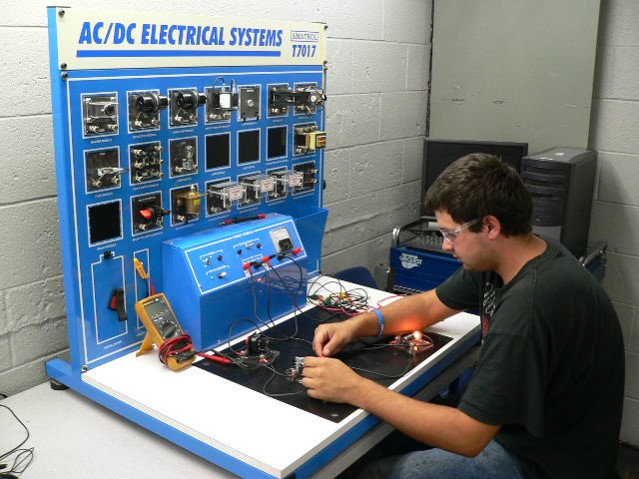|
Award Levels
|
Credit Hours Required
|
Time to Completion
|
|
Certificate
|
45
|
2 Years
|
 |
Maintenance mechanics work in every industry that uses machinery. Examples include but are not limited to cement manufacturing plants, hospitals, apartment complexes, school districts, petroleum refineries, clothing manufacturers, transportation manufacturers, and food processing.
Maintenance mechanics install and maintain equipment with the goal of ensuring that all machines function properly. They perform preventative maintenance, troubleshoot problems, and repair machines. Students must have technical/mechanical aptitude, the ability to handle and operate hand-held power tools, mobility, and the ability to stand and sit at a workstation for several hours.
|
|
The Bureau of Labor Statistics forecasts that employment of maintenance mechanics will grow 13 percent through 2032. The need to keep increasingly sophisticated machinery functioning and efficient will continue to create demand for these workers. The average wage is $60,990 based on the May 2022 Occupational Employment and Wage Statistics for Kansas as published by the Bureau of Labor Statistics.
This program is designed to prepare students to obtain the National Center for Construction Education and Research (NCCER) certification as an Industrial Maintenance Mechanic. In addition, the program prepares students to take the Society for Maintenance & Reliability Professionals Certifying Organization’s exam to become a Certified Maintenance & Reliability Technician (CMRT).
|
|
|
|
|
Interested in this program?
Contact an Advisor!
outreach@neosho.edu
(620)432-0406
|

Program Path
Recommended Sequence of Courses
|
(Fall) Semester I
|
|
Credit Hours
|
|
CMCT 105
|
OSHA 10 Safety Orientation
|
1
|
|
CMCT 106
|
Introduction to Craft Skills
|
3
|
|
IMT 102
|
Mechanical Systems
|
3
|
|
IMT 104
|
Industrial Maintenance Technology I
|
3
|
| |
Total
|
10
|
|
(Spring) Semester II
|
|
|
|
IMT 112
|
Industrial Programmable Logic Controls
|
3
|
|
IMT 114
|
Industrial Maintenance Technology II
|
3
|
|
HVAC 103
|
Electrical Fundamentals
|
4
|
| |
Total
|
10
|
|
(Fall) Semester III
|
|
|
|
IMT 202
|
Mechanical Systems Reliability
|
3
|
|
IMT 204
|
Industrial Maintenance Technology III
|
3
|
|
IMT 206
|
Electrical Control Systems I
|
2
|
|
ETEC 136
|
Industrial Internship
|
2
|
|
|
Total
|
10
|
|
(Spring) Semester IV
|
|
|
|
IMT 210
|
Industrial Process Control
|
3
|
|
IMT 212
|
Industrial Fluid Power
|
4
|
|
IMT 214
|
Industrial Maintenance Technology IV
|
3
|
|
IMT 216
|
Electric Control Systems II
|
2
|
|
ETEC 136
|
Industrial Internship
|
3
|
|
|
Total
|
15
|
|
Level I Certificate Credits
|
45
|
General Education Courses
The Maintenance Technology certificate program may be a terminal certificate program leading directly to employment. Certificate students are not required to take specific general education courses. Students wishing to pursue continued education, may apply the Maintenance Technology credits toward the Associate of Applied Science (AAS) in Industrial Engineering Technology degree. The AAS degree requires 64 credit hours, which includes technical courses, general education courses and electives.
Program Outcomes
1. Demonstrate an understanding of safety, responsibility, and OSHA standards.
2. Assemble, install, and ensure operation of machinery and mechanical equipment by completing preventive maintenance requirements on engines, motors, pneumatic tools, conveyor systems, and production machines.
3. Utilize diagrams, blueprints, operations manuals, manufacturer's instructions, and engineering specifications to ensure proper mechanical operations.
4. Demonstrate an understanding of electrical control, motor drives, and programmable logic controllers.
5. Demonstrate an understanding of hydraulic and pneumatic installation and troubleshooting.
6. Demonstrate laser shaft alignment.
7. Demonstrate variable frequency drives installation and repair.
8. Demonstrate effective troubleshooting skills.
9. Remove defective parts by dismantling devices using hoists, cranes, and hand and power tools.
10. Determine changes in dimensional requirements of parts by inspection using rules, calipers, micrometers, and other measuring instruments.
11. Adjust functional parts of devices and control instruments by using hand tools, levels, plumb bobs, and straightedges.
12. Demonstrate employability skills necessary for a career as an industrial maintenance mechanic.